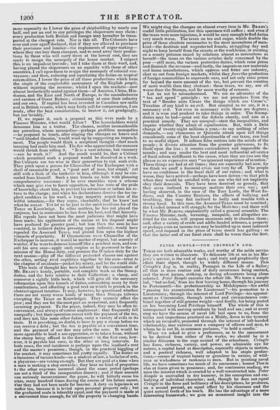PETER SIMPLE-TOM CRINGLE'S LOG.
THESE are both admirable works, and worthy of the noble service they are written to illustrate. To delineate life at sea in his Ma- jesty's service, is the end of each; and truly and graphically they effect their object, though by widely 'different means. TOM Cringle's Log is, in reality, Passages in the Life of a Sailor; all that is mere routine and of daily occurrence being omitted, and the most joyous, striking, or daring adventures being alone selected. Peter Simple narrates the whole life. We trace a simple lad, " but no fool," from his first leaving home, through his journey to Portsmouth—his probationership as Midshipman—his awful " passing his examination for Lieutenant"—his promotion to a Lieutenancy, through the interest of Lord Privilege—his appoint- ment as Commander, through interest and circumstances com- bined together of still greater weight—and finally, his being posted on his becoming Lord Privilege himself. The whole of this is interspersed with moving accidents by land and sea ; and at every step we have the arcana of naval life laid open to us, from the tricks and impositions practised on a Middy, down to the tyranny which an incapable, promoted through the interest of left-handed relationship, may exercise over a company of officers and men, to whom he is not fit, in common parlance, "to hold a candle."
Were we asked to give a preference, as to the amusement to be derived from either of the works, we should be in a similar dilemma to the sage animal of the schoolmen. Cringle has force, richness, variety, and power, an admirable eye for nature, a capital hand at description, especially objects in motion, and a poetical richness, well adapted to his staple produc- tions,—scenes of tropical beauty or grandeur in nature, of wild- ness or wickedness or rankness in man. But in painting naval life, we have sometimes too much of its coarseness ; honest Tornis also at times given to prosiness • and, for continuous reading, we miss the interest which is created by a well-constructed tale. Peter Simple is unrivalled in dry humour, in the conception and em- bodying of individual character; and, though he does not equal Cringle in the force and brilliancy of his descriptions, he produces, on a second perusal, an equal effect by his clearness and the quiet natural truth of his touch. He has the advantage of a more interesting framework; we gain an occasional insight into the


















 Previous page
Previous page